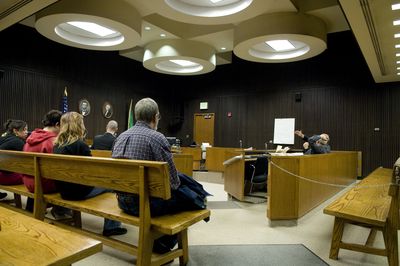Reordering the court
Spokane cuts county ties to create municipal system

Spokane leaders this week severed a partnership with county courts that began in the early 1960s.
Starting Jan. 2, the city will leave the Spokane County District Court and operate an independent municipal court to handle misdemeanor cases originating within city limits.
The separation, which was finalized in a unanimous vote Monday by the Spokane City Council, will force a series of rapid decisions to create a new city court system and revamp the county’s District Court within one month.
Challenges include the transfer of thousands of open cases to the new court. Officials also must determine whether some court partnerships, including programs focused on domestic violence and defendants with mental health problems, will withstand the separation.
It’s even uncertain where the new court will be located. City officials hope to continue using space at the Public Safety Building, but county commissioners say they could use the space and may raise the rent. City Attorney Howard Delaney said the new court could be housed in a building the city leases on West Gardner Avenue.
Spokane Mayor Mary Verner has until the end of the year to appoint two judges and perhaps two court commissioners to the new court.
County leaders say they will maintain their nine elected judgeships but cut five court commissioners to make up for the lost caseload.
City Council President Joe Shogan said staying with the District Court would have put city misdemeanor cases at risk.
“This is in the best interest of the city,” Shogan said. “I don’t have any doubt about that.”
But County Commission Chairwoman Bonnie Mager called the city’s decision a “giant step backwards.”
“It creates another level of separation,” she said.
City and county officials have been meeting for about a year to decide how to respond to a decision from a state appeals court that overturned DUI convictions of two Spokane men represented by the Center for Justice. That ruling said District Court judges had no authority to hear city cases because state law requires city misdemeanor charges to be considered by judges elected only by city voters. District Court judges are elected countywide.
As of last week, county leaders said they thought they were close to crafting an agreement that would keep city cases in the District Court.
But that proposal was counting on legislators to rewrite state law to allow judges who handle city cases to be elected countywide.
Until the law is changed, city leaders say there is too much risk that cases could be challenged.
“I thought we had complete agreement,” said District Court Presiding Judge Richard White, who expressed “profound disappointment” at the separation. The mayor “evaluated the risk as being too severe, and we have to respect that evaluation.”
Breean Beggs, executive director of the Center for Justice, said the city made the best decision.
“There’s no doubt that it’s completely compliant with the law,” Beggs said.
The case that started the recent controversy, City of Spokane v. Lawrence J. Rothwell, will be heard by the state Supreme Court next year.
Under state law, the city had to decide by Monday whether to create a separate municipal court.
The city’s decision is a significant shift from five weeks ago when Verner and White announced in a press release that they were on track to craft an agreement that extended the partnership.
“We had originally envisioned (the new state law) being more flexible than it actually was,” said Delaney, the city attorney.
County Commissioner Todd Mielke pointed to studies – including the city’s own Matrix efficiency report – that say a combined court system costs less.
“On behalf of the taxpayers, it works better to have a consolidated court system,” he said.
But Delaney questioned the studies and said a separate municipal court won’t cost much more than what the city pays now.
White said he had hoped that the city and county could work toward a consolidated court. In such a system, a defendant accused of crimes inside and outside city limits would only need one public defender, one prosecutor and one judge. That scenario will become more unlikely with a separate municipal court, he said.
Recent negotiations were “laying the foundation for continuous discussions toward consolidation,” White said. “There was an opportunity, and it’s been lost, and I don’t believe it’s coming back for a long time.”
Delaney said the city and county could still move forward slowly on consolidation, perhaps through domestic violence and mental health courts. If those efforts are successful, more efforts could be tried, he said.
A separate city system likely will improve service to the city because judges will answer only to city voters, Delaney said.
“The taxpayers will find the court far more responsive to the needs of the community,” he said.